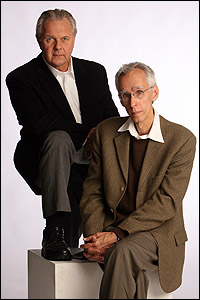
All told, the two men have worked on more than a dozen projects, including the Broadway perennial White Christmas, Ives' Off-Broadway plays Polish Joke and New Jerusalem, as well as the many adaptations of old musicals Ives did when Bobbie was in charge of the Encores! musicals-in-concert series at City Center. They're currently back together at Classic Stage Company, where Ives' new two-character play, Venus in Fur, directed by Bobbie, started Jan. 13 in Manhattan's East Village. Ives talked to Playbill.com about why two Polish-Catholic-American theatre guys get along so well.
Playbill.com: What number collaboration with Walter Bobbie is this for you?
David Ives: Walter counted 15 projects we worked on in one way of another together.
Playbill.com: And not just as a director. He's been an actor in at least one of your plays, Polish Joke.
DI: At Manhattan Theatre Club. He auditioned for me for Polish Joke after he had been my boss at Encores! And that is an amazing change in a relationship. And yet it was very easy. He knows me. I know him. He could walk into a room and just do what he did. He gave a brilliant audition and [director] John Rando and I said instantly, "This is our guy."
Playbill.com: What is it about the combination of your two personalities, that you two work so well together?
DI: Oh, wow. That is untraceable. I think we have very similar tastes, for one thing. Starting from similar tastes, we have crossovers in other places. Walter has written material and scripts. So he has knowledge as a writer that many directors don't have. We also share blue-collar, Polish-Catholic backgrounds. I like to say we're "Bi-Polish." We can both sing the same Polish Christmas carols. But there is some ineffable meeting of the minds that was apparent very early on. He invited me to work on an Encores! show called Out of This World, which is how we met. We just clicked on that show. He was running Encores! at the time. I recognized that this guy knew so much about an area that I knew so little about, which was musical theatre. I watched him administrate that show, and his insights were so extraordinary that I realized that this was a man who had an extraordinary grasp of producing and directing. We then collaborated on my next Encores!, which was DuBarry Was a Lady. As Walter likes to say, we got to have a flop together early on. Because DuBarry did not work at all, and we both suspect that it didn't work because we were doing it together and we were having so much fun sitting across the table and adapting it that we failed to see that we weren't really doing the job as well as we should have. Because we survived that show, we were able to go on kind of freely. Our mutual respect for what we are as people is profound and you bypass so much of the garbage of looking for a collaborator. Finding the right collaborator is hard.
 |
||
| Walter Bobbie and David Ives |
DI: It draws on it to the extent that, in this play, a playwright is auditioning an actress for his adaptation of Venus in Fur, which an erotic novel from the 1870s. My play goes in and out of the audition room and what we call the play-within-a-play, based on Leopold von Sacher-Masoch's book. There are sections of it that are my — alias his, the playwright character's — adaptation of Sacher-Masoch. And then there is the play that's happening in the present with the playwright and the actress getting deeper and deeper into the material. Playbill.com: What drew you to the book in the first place?
DI: Well, this project began because I had an idea years ago of adapting "Story of O" to the stage, the French erotic novel of the 1940s. When I was in college, everyone read that book. It was a notorious book of the time. I thought it was an extraordinary novel. A few years ago, I read it again and it held up. I got this idea for adapting it and thought I had a great way to do it. The problem is the rights are totally tangled up at this point. I couldn't get the stage rights. Which ended up being a blessing. Frustrated with that, I went to "Venus in Fur," which is sort of the same area. I read it and thought, "This is even more dramatic." It was sort of the same themes of power and lack of power. All those ideas I had brought to "Story of O" I brought to "Venus in Fur." It actually ended up being a much richer patch of ground to work. It's an extraordinary book. It's rather gruesome reading, but it's also a spiritual novel in a way.
Playbill.com: How's the play going?
DI: Well, I'm not allowed to say! There was a playwright at Yale who always answered that question with "It's too early to tell." Even when it was closing night of his play, you'd ask "How's your show going?" and he'd say "It's too early to tell."
Playbill.com: Encores! is doing Anyone Can Whistle this season. When the librettist of an Encores! show is alive, as in the case of Arthur Laurents, do you work with them?
DI: Arthur didn't want to adapt this for Encores! He was, of course, offered the job. Casey Nicholaw and he and I met and he said, "Do you have any questions?" And I said, "Yes. Why didn't you want to adapt this?" He said, "Because it's too hard." I was glad to hear that from the horse's mouth, because it is hard.










